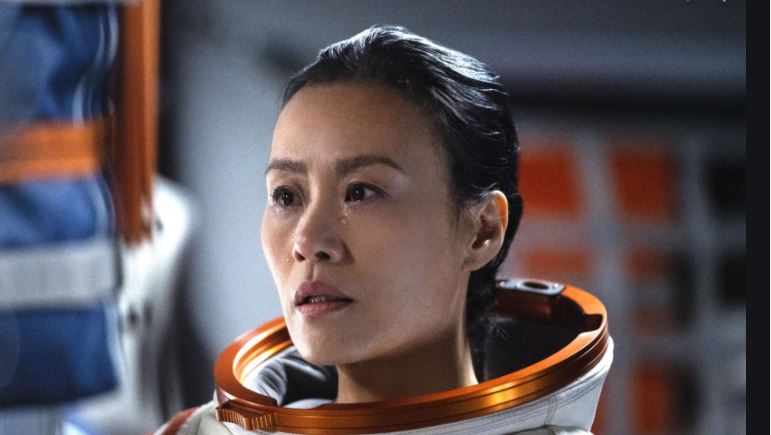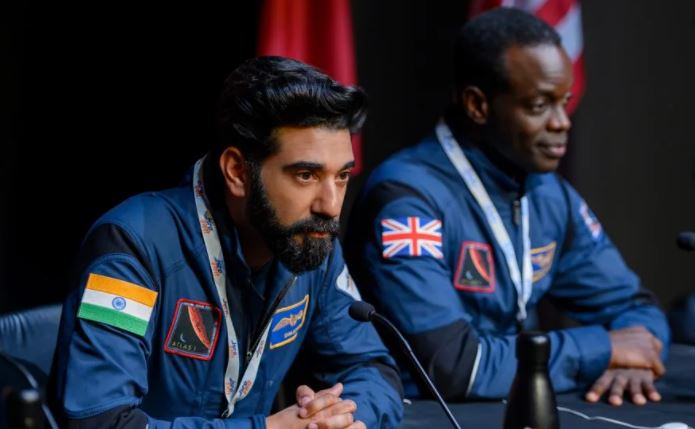“Away” (L to R) Vivian Wu as specialist Lu Wang and Ray Panthaki as Captain Ram Arya, in episode 102 of ‘Away.’ Photo by Diya Pera for Netflix.© 2020
By Jana Monji, AsAmNews Arts & Culture Writer
Asians have a prominent place on the five-member team of Netflix’s mission to Mars drama, Away. Although the focus is on the team commander, Emma Green, played with gritty determination by Hilary Swank, two episodes help introduce the audience to Asian culture. The five nations represented on the mission include India and Communist China as well as the US, Russia and the UK.
The ten-episode series dropped on Netflix on Friday and gives an intelligent look at the sacrifices necessary to get to Mars and all the things that may go wrong. These astronauts aren’t space cowboys, but highly trained individuals who carry the weight of nations on their shoulders.
Don’t expect action scenes or aliens. The development is slow, aided by flashbacks and references to past problems and criticisms of the space program. To bolster the emotional center, the plot includes illnesses–one on Earth and the other on the spacecraft Atlas.
The main focus for Season One is the family of the Commander Green whose husband Matt Logan (Josh Charles) and daughter Alexis Logan (Talitha Bateman) deal with the husband’s catastrophic health issues on Earth. Yet the commander also becomes the primary caretaker when one of the crew members becomes temporarily ill.
The 10 episodes of Season One cover the 8-month journey to Mars with a pit stop at the moon, Lunar Base Alpha. The mission is to be three years long. In the first episode, the crew begins with seemingly natural alliances: China’s astronaut, specialist Lu Wang (Vivian Wu) and Russia’s Misha (Mark Ivanir) side with each other after the first crisis on board Atlas. Lu is the chemist and Misha is the ship’s engineer. This might seem stereotypical, but their initial alliance slowly transforms.
Ram (Ray Panthaki), the crew’s captain and number two in command, remains supportive of the commander. The captain is also most likely to alleviate tense situations with humor. Kwesi is the odd man out with the least amount of time in space. He also feels the pull of two nations: Ghana and the UK. Orphaned as a young child, Kwesi was adopted by Jewish parents and grew up in the UK. He is the only religious crew member.
While Kwesi brings up issues of faith and immigration, Lu’s backstory brings up issues of freedom and oppression. Episode 3, Half the Sky, focuses on Lu and her family. When Houston Ground team member Mei (Nadia Hatta) is suddenly transferred. Lu becomes upset. Mei’s replacement, a White American, spreads a rumor about Mei and Lu. Lu believes Emma was the culprit. Through flashbacks, we learn about Lu and Mei. Emma is able to extend a helping hand, changing her relationship with Lu.
The episode’s title is from a Mao Zedong quote that “women hold up half the sky,” (妇女能顶半边天). Yet in Communist China that sentiment doesn’t always work out to be equality of the sexes. The message isn’t strident and Lu remains one of the more admirable and self-reliant characters of this series. However, a slight wedge forms between Lu and Misha.
Ram is not only the captain, but he is the medical officer, but what happens when one gets sick in space? Feverish from a common Earthly ailment, Ram has delusions: He sees his dead brother in Episode 4, Excellent Chariots. The episode explains why Ram is alienated from his family. Although he portrays himself as a playboy, Ram was close to his older brother. Through flashbacks, the audience sees how his older brother fueled his dreams of becoming an astronaut. His brother tells of Vimāna, the flying palaces or fiery chariots belonging to the gods of Hindu myths. These chariots will take them to Mars, but Ram’s brother died long ago.
His brother never left Ram while he was sick. Likewise, Emma cares for Ram who then suffers from Florence Nightingale effect. Sensing Ram’s romantic attraction, Emma draws away, increasing her isolation.

There are other things that can cause alienation within a family. In Episode 8, Vital Signs, we’re reminded of the heavy burden of the one-child policy. As an only child, Lu was a disappointment to her father who wanted a son. Lu’s insight into father-daughter relationships helps Misha sort out his.
The history of space exploration isn’t ignored either. The title of Episode 9, Spektr, refers to an actual incident on the space station Mir. Spektr launched in 1995 (20 May) and docked in June of that year. Designed for remote observation of Earth, Spektr contained atmospheric and surface research equipment. In 1997, an unmanned spacecraft, the Progress M-34, crashed into Spektr during a docking maneuver. The result was a slow leak.
In the series, Atlas forms a leak after the crew attempts to resolve their water supply problem. Ram and Emma perform a risky maneuver to get a water supply. Ram’s attraction to the married Emma becomes more apparent.
There is the threat, both on Earth and in space, that this series could fall into a soap opera territory. I hope this doesn’t happen. Of course, one has to acknowledge, particularly after Natalie Portman’s Lucy in the Sky, that curious scandals have occurred in the US space program. If you haven’t seen that film, then perhaps you’ve heard of tawdry story of an astronaut love triangle involving Lisa Nowak and her 14-hour adult diaper-aided drive to become the first US astronaut arrested.

In the last episode, the five-member team’s families are brought together at NASA Mission Control for the Mars touchdown. We have yet to see interaction between the families, but perhaps that will happen in following season(s). It is a bit of a disappointment that the two men of color, Ram and Kwesi, have no wives or main squeeze back at home. On the other hand, Misha is a widower whose wife died while he was in space.
According to documentaries on Apollo 11, the astronauts and their families formed a support group. So it’s surprising that we see so little interaction between the crew’s family, particularly since we’re told that the crew trained together for two years. The international boundaries and politics may have kept them apart, but the possibility of more cultural exchange and understanding makes me hopeful for following seasons.
This is an intelligent, well-research science fiction drama with complex depictions of Asian astronauts and their families. Neither Lu nor Ram are sidelined as work horses. Everyone on the Atlas mission are race horses. By the end of Season One, the crew has become more of a team, with changed alliances and increased respect and trust. The theme seems to be international communities reaching to find “a better world, a world beyond division and confusion and fear.” The message is certainly timely enough.
For a full recap of Season One, visit AgeOfTheGeek.org.
AsAmNews has Asian America in its heart. We’re an all-volunteer effort of dedicated staff and interns. Check out our new Instagram account. Go to our Twitter feed and Facebook page for more content. Please consider interning, joining our staff, or submitting a story.



